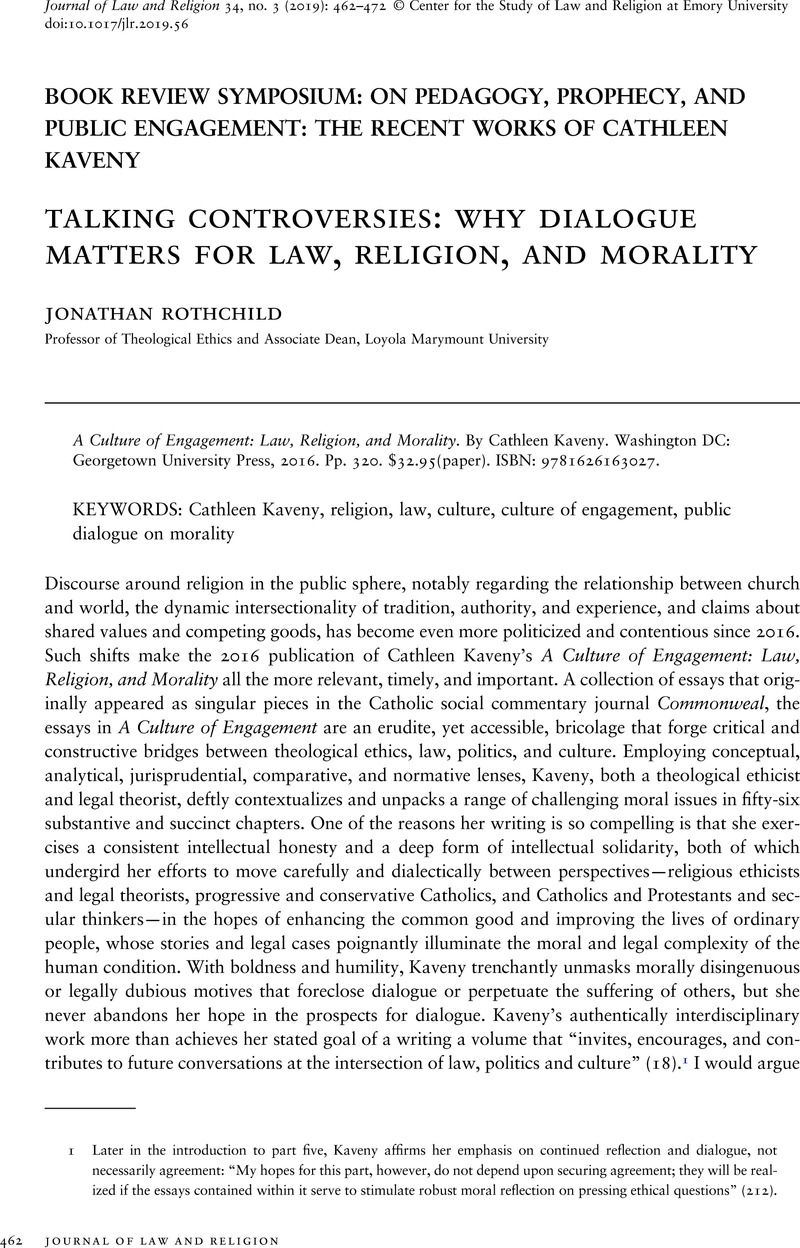Article contents
TALKING CONTROVERSIES: WHY DIALOGUE MATTERS FOR LAW, RELIGION, AND MORALITY - A Culture of Engagement: Law, Religion, and Morality. By Cathleen Kaveny. Washington DC: Georgetown University Press, 2016. Pp. 320. $32.95(paper). ISBN: 9781626163027.
Review products
Published online by Cambridge University Press: 24 February 2020
Abstract

- Type
- Book Review Symposium: On Pedagogy, Prophecy, and Public Engagement: The Recent Works of Cathleen Kaveny
- Information
- Copyright
- Copyright © Center for the Study of Law and Religion at Emory University 2020
References
1 Later in the introduction to part five, Kaveny affirms her emphasis on continued reflection and dialogue, not necessarily agreement: “My hopes for this part, however, do not depend upon securing agreement; they will be realized if the essays contained within it serve to stimulate robust moral reflection on pressing ethical questions” (212). Kaveny adopts a similar goal in her Ethics at the Edges of Law, where she develops critical conversations between law and religion in the hopes of “whet[ting] the appetite of religious moralists to mine the legal field for helpful points of consonance, just as they mine the field of philosophy.” Ethics at the Edges of Law: Christian Moralists and American Legal Thought (New York: Oxford University Press, 2018), 242.
2 Kaveny, Cathleen, Law's Virtues: Fostering Autonomy and Solidarity in American Society (Washington, DC: Georgetown University Press, 2012)Google Scholar.
3 Kaveny, Cathleen, Prophecy without Contempt: Religious Discourse in the Public Square (Cambridge, MA: Harvard University Press, 2016)CrossRefGoogle Scholar.
4 Kaveny, Cathleen, Ethics at the Edges of Law: Christian Moralists and American Legal Thought (New York: Oxford University Press, 2018)Google Scholar.
5 Among numerous examples, see Stuntz, William J., The Collapse of the Criminal Justice System (Cambridge: Belknap Press of Harvard University Press, 2011)CrossRefGoogle Scholar; Alexander, Michelle, The New Jim Crow: Mass Incarceration in the Age of Colorblindness (New York: New Press, 2012)Google Scholar; Logan, Samuel James, Good Punishment? Christian Moral Practice and U.S. Imprisonment (Grand Rapids: William B. Eerdmans, 2008)Google Scholar; Gottschalk, Maria, Caught: The Prison State and the Lockdown of American Politics (Princeton: Princeton University Press, 2014)Google Scholar; and Rothchild, Jonathan, Bolton, Matthew Myers, and Jung, Kevin, eds., Doing Justice to Mercy: Law, Religion, and Criminal Justice (Charlottesville: University of Virginia Press, 2007)Google Scholar.
6 Kaveny, Ethics at the Edges of Law, 133.
7 Unsurprisingly, given her commitments to interpretation and context as part of the culture of engagement, Kaveny offer criticisms of originalist positions: for example, “An approach rigidly focused on the explicit provisions of the text and the intention of the framers is both theoretically and practically inadequate” (33).
8 Franchise Tax Board of California v. Hyatt, No. 17-1299, slip op. at 13 (U.S. May 13, 2019) (Breyer, J., dissenting).
9 Franchise Tax Board of California, slip op. at 13.
10 Kaveny, Ethics at the Edges of Law, 30–31.
11 For further discussion, see Heyer, Kristin E., Prophetic and Public: The Social Witness of U.S. Catholicism (Washington, DC: Georgetown University Press, 2006)Google Scholar.
12 For representative texts, see Rawls, John, A Theory of Justice (Cambridge, MA: Belknap Press of Harvard University Press, 1971)Google Scholar; Rawls, John, Political Liberalism, expanded ed. (New York: Columbia University Press, 2005)Google Scholar; Rorty, Richard, “Religion as Conversation-Stopper,” in Philosophy and Social Hope (Harmondsworth: Penguin Books, 1999), 148–75Google Scholar; Rorty, Richard An Ethics for Today: Finding Common Ground between Religion and Philosophy (New York: Columbia University Press, 2010)Google Scholar; Milbank, John, Theology and Social Theory: Beyond Secular Reason (Malden: Blackwell, 1990)Google Scholar; Milbank, John, The Word Made Strange: Theology, Language, Culture (Oxford: Wiley-Blackwell, 1997)Google Scholar; Hauerwas, Stanley, A Community of Character: Toward a Constructive Christian Social Ethic (South Bend: University of Notre Dame Press, 1991)CrossRefGoogle Scholar; and Hauerwas, Stanley and Willimon, William H., Resident Aliens: Life in the Christian Colony, 25th anniversary ed. (Nashville: Abingdon Press, 2014)Google Scholar.
13 Kaveny writes, “such [culture-war] thinking is far more at home in Protestant Christianity than in Roman Catholicism” (158).
14 See, for example, Sen, Amartya, The Idea of Justice (Cambridge, MA: Belknap Press of Harvard University Press, 2009)CrossRefGoogle Scholar, and Cahill, Lisa Sowle, Theological Bioethics: Participation, Justice, and Change (Washington, DC: Georgetown University Press, 2005)Google Scholar. In Prophecy without Contempt, Kaveny develops her own critique of positions similar to MacIntyre and Rawls: “all assume that most significant discourse in the American public square can be understood and analyzed as a form of practical deliberation. In my view, this assumption is false” (5).
15 For my own articulation of a method within law and religion, see Rothchild, Jonathan, “Law, Religion, and Culture: The Function of System in Niklas Luhmann and Kathryn Tanner,” Journal of Law and Religion 24, no. 2 (2009): 475–506CrossRefGoogle Scholar.
16 As she further elaborates in Prophecy without Contempt: “In my view, the best way to foster mutual respect in the public square is by undertaking, and asking others to undertake, the hard work of explaining our viewpoints on matters of public discourse in the terms that we actually believe to justify those viewpoints—whether or not those terms conform to the strictures of public reason” (61, original emphasis).
17 MacIntyre, Alasdair, Whose Justice? Which Rationality? (Notre Dame: University of Notre Dame Press, 1988)Google Scholar; MacIntyre, Alasdair, After Virtue: A Study in Moral Theory Notre Dame: University of Notre Dame Press, 1981)Google Scholar.
18 Kaveny, Prophecy without Contempt, 28.
19 Kaveny, Prophecy without Contempt, 45.
20 In Ethics at the Edges of Law, Kaveny offers a similar appreciation for restorative justice practices as part of Christian love in the legal realm, where it “can identify previously invisible stakeholders and uncover previously unnoticed problems that deserve our urgent attention.” Kaveny, Ethics at the Edges of Law, 161.
- 1
- Cited by


